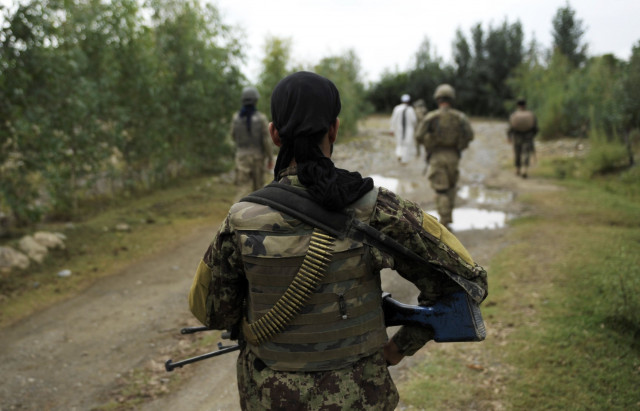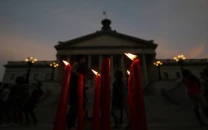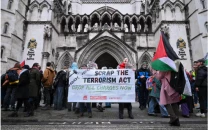Nato's Afghan strategy in jeopardy: Experts
Warn that NATO's decision to limit joint operations with Afghan forces threatens the alliance's strategy.

Announced on Tuesday, the move marks a setback to the US-led strategy for containing an 11-year Taliban insurgency, as a phased withdrawal of Western troops hinges on training and advising Afghan forces to take their place.
The decision was taken in a powder keg environment as protests sweep the Muslim world, and after an uptick in insidious blue-on-green attacks that have seen 51 NATO personnel shot dead by their local colleagues so far this year.
"It's a serious challenge to the strategy," Stephen Biddle, a George Washington University professor specializing in Afghanistan, told AFP.
NATO aims to train 350,000 Afghan soldiers and police by the end of 2014 as it transfers all security responsibilities to President Hamid Karzai's local forces.
The alliance is gradually withdrawing the 112,600 troops remaining in its ISAF force. The Pentagon said last week that there are currently 77,000 US troops in Afghanistan.
Jeffrey Dressler, senior research analyst at the Institute for the Study of War, said the effect on NATO's drawdown strategy depends on how long the limitations on joint operations remain in place.
"It's a minor setback at this point, but the significance of it obviously will increase with the length of time that the order stands," Dressler said. "If it continues for months, then it's definitely going to have an impact."
Australian Brigadier-General Roger Noble, deputy to ISAF's operations' chief, admitted the recent string of green-on-blue attacks had been dispiriting.
"The problem with the insider attack is it strikes right at the heart of our resolve," he told Pentagon journalists from Kabul. "It's one thing to be killed in action by the insurgents. It's quite another to be shot in the back of the head at night by your friends."
Noble said the decision to scale back joint operations was "just normal military business and common sense," and insisted it would not derail the drawdown effort.
"The bottom line is that beneath the noise and turbulence of day-to-day operations and events, the campaign remains on track to achieve its objectives," he said.
President Barack Obama's administration is under pressure from some to rethink its strategy, with three leading senators asking for a "strategic pause" to troop withdrawals.
"We cannot afford to rush to failure in Afghanistan," Republicans John McCain and Lindsey Graham, and Independent Senator Joe Lieberman wrote in a letter.
"We believe those conditions are now worrisome enough to justify an immediate suspension of further US troop withdrawals at this time."
During a videoconference with Karzai on Wednesday, Obama focused partly on the unprecedented wave of attacks on NATO troops by local comrades. The White House said the president was committed to pursuing his drawdown timetable.
US Defense Secretary Leon Panetta, speaking in Beijing, said the attacks were worrisome but insisted they would not delay or derail plans to complete a withdrawal of troops by the end of 2014 as planned.
Only a quarter of the insider attacks are believed to be the result of Taliban infiltration, and Biddle feared they could just be the "visible tip of a much larger iceberg" that is the inability of Western and Afghan forces to work together.
"It's a lot easier to fix an infiltration problem than cultural incompatibility," he said. "I think it has serious consequences for the way forward in the war."
Sarah Chayes, a former adviser to the chairman of the Joint Chiefs of Staff, was more categorical.
"We already know that this together strategy doesn't work," said Chayes of the Carnegie Endowment for International Peace.
"The Afghan army is only an arm of the government. If they don't deal with the problem of governance and of corruption in the heart of the Afghan government, or the role of Pakistan, I can't really see a lasting solution."






1644560129-0/download-(20)1644560129-0-208x130.webp)











COMMENTS
Comments are moderated and generally will be posted if they are on-topic and not abusive.
For more information, please see our Comments FAQ